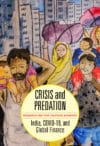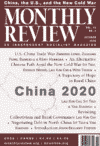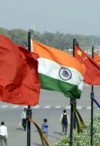Political Economy

With the advent of COVID-19, India’s rulers imposed the world’s most stringent lockdown on an already depressed economy, dealing a body blow to the majority of India’s billion-plus population. Yet the Indian government’s spending to cushion the lockdown’s economic impact ranked among the world’s lowest in GDP terms, resulting in unprecedented unemployment and hardship. Crisis and Predation shows how this tight-fistedness stems from the fact that global financial interests oppose any sizable expansion of public spending by India, and that Indian rulers readily adhere to their guidance. Meanwhile, under the banner of reviving private investment, India’s rulers have planned giant privatizations, and drastically revised laws concerning industrial labor, the peasantry, and the environment—in favor of large capital. | more…

As stated in the United Nations Universal Declaration of Human Rights, health is a fundamental human right. However, we find ourselves in the midst of the COVID-19 pandemic with a shortage of both human and material health resources, most of which must be sourced from the private sector. Some of the wealthiest countries—France, Italy, Spain, the United Kingdom, and the United States—have proved unable to respond rapidly. The evolution of public health over the past four decades, during which government health policies have reduced health services to commodities and objects of speculative investment, has led to the current crisis. | more…

The story of the consumer’s involvement in the sphere of production is not new, as consumers have been providing unpaid labor to and otherwise subsidizing capitalism since at least the mid–twentieth century. Yet, as the economy has evolved so too have the scope and complexity of consumer work. | more…

The COVID-19 pandemic shocked the world. It shouldn’t have. Since this century’s turn, epidemiologists have warned of new infectious diseases. Indeed, H1N1, H7N9, SARS, MERS, Ebola Makona, Zika, and a variety of lesser viruses have emerged almost annually. But what of the epidemiologists themselves? Some bravely descended into the caves where bat species hosted coronaviruses, including the strains that evolved into the COVID-19 virus. Yet, despite their own warnings, many of the researchers appear unable to understand the true nature of the disease—as if they are dead to what they’ve seen. Dead Epidemiologists is an eclectic collection of commentaries, articles, and interviews revealing the hidden-in-plain-sight truth behind the pandemic: Global capital drove the deforestation and development that exposed us to new pathogens. | more…

This special issue of Monthly Review, “China 2020,” is the product of a long period of cooperation with critical Chinese Marxist scholars. This has resulted in an extensive series of articles on contemporary Chinese social and economic relations since 2012, to which most of the authors in the present issue have previously contributed. It takes on a special significance due to the growing conflict between the United States and China, making critical Marxist analysis in this area all the more important. | more…

In the twenty-first century, all signs are pointing to another period of hegemonic struggle over the world economy, this time between the United States and China, although complicated in this case by the unique, indeterminate aspects of the post-revolutionary Chinese social formation, which is neither entirely capitalist nor entirely socialist. | more…

Has the Real "Thief" Finally Been Unmasked?
In 2018, Washington launched the trade war against China. Measures included sharply increasing the customs tariffs borne by certain products imported from China, further barriers to imports from China, and sanctions against Chinese companies targeted by bans on the use of U.S.-made inputs. By June 2019, as tariff increases hit new sectors, China was no longer the United States’s largest trading partner. | more…

During the 1960s, China was effectively excluded from the two major camps: the Soviet camp and the U.S. camp. For about a decade, China was obliged to seek development within its own borders and thereby achieved some extent of delinking: a refusal to succumb to U.S.-eurocentric globalization and an embrace of a people’s agenda of development. While foreign relations were later normalized and China once again brought in foreign capital, since being explicitly targeted as the primary rival of the United States, however, the situation may again warrant moves toward delinking and searching for alternatives, with ups and downs along the way. | more…

The Making of Puhan Rural Community in North China
Originally set up in 1998 in China, the Puhan Rural Community was the first peasant-initiated, cross-village organization established after the collapse of the top-down people’s communes and the implementation of the household responsibility system. Puhan learned a lesson about the exploitation of usurious microfinance and decided that it was capable of establishing a system of mutual aid credit by itself, changing the cultural emphasis on money. Its story of struggling with rural financial organizations opens up a debate on the trap of marketization and monetization, the root causes of loans and debts, the negotiating power of collectives, the production mode of ecological agriculture, and the redefinition of the commonwealth. | more…

Will the Triple Crisis Bring a Working-Class Revolt in the United States?
Crisis reveals the fault lines in society. COVID-19 is wreaking havoc on our health and killing us in large numbers, bringing with it the most massive and steep economic collapse in U.S. history. Then, there was the murder of George Floyd and the resulting astonishing global protests against racism. Anyone can see that capitalism, facing no real opposition in decades, has reverted to its default position: only profit rules us and those with money will beat down those with none, without mercy or remorse. | more…

Since the emergence of COVID-19, the United States has quite openly decided to use the crisis, at a global scale, as a weapon against its perceived rival, China. In this context, India has taken a number of steps to restructure its relation to China, asserting economic stances and implementing policies that are becoming more and more closely entwined with its geopolitical positions and aspirations. | more…

Among ethnic disasters of the past few decades, few can match in intensity or have been reported in the media more extensively than those of the Indigenous in Guatemala. The social structure of the nationÑits hierarchy, driven by a light-skinned population, most of whom are ethnically mestizo but who do not identify with the purely IndigenousÑits history, and its small size make it an important site for the documentation and reporting of ethnic disputes and differences. | more…











